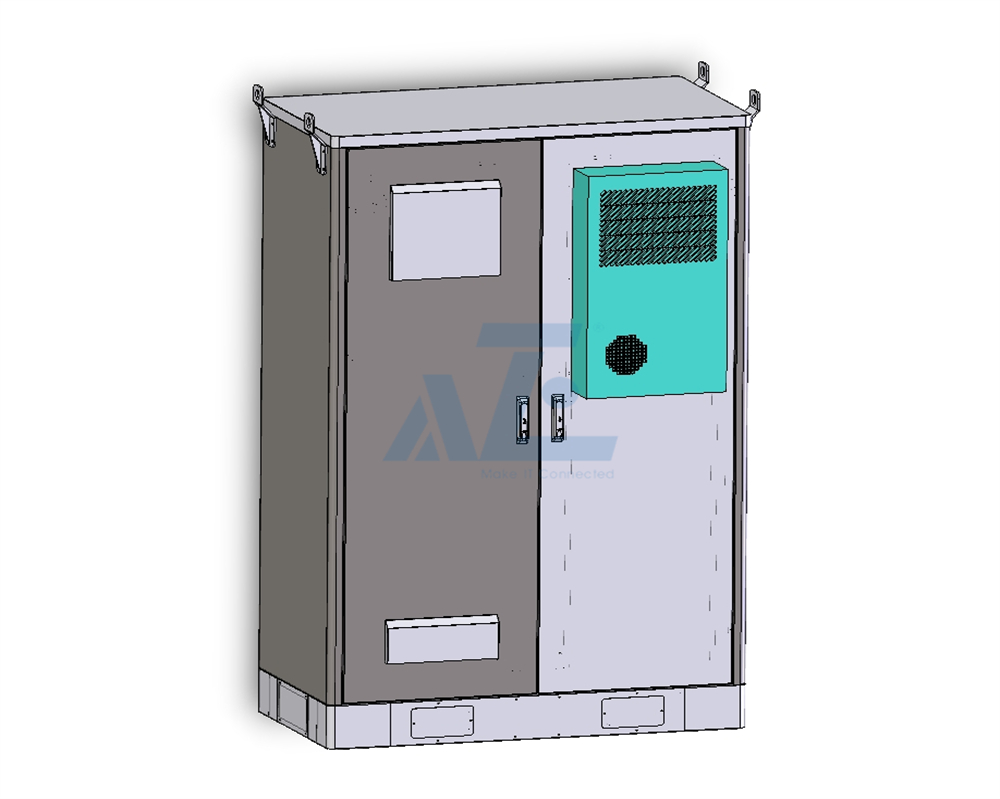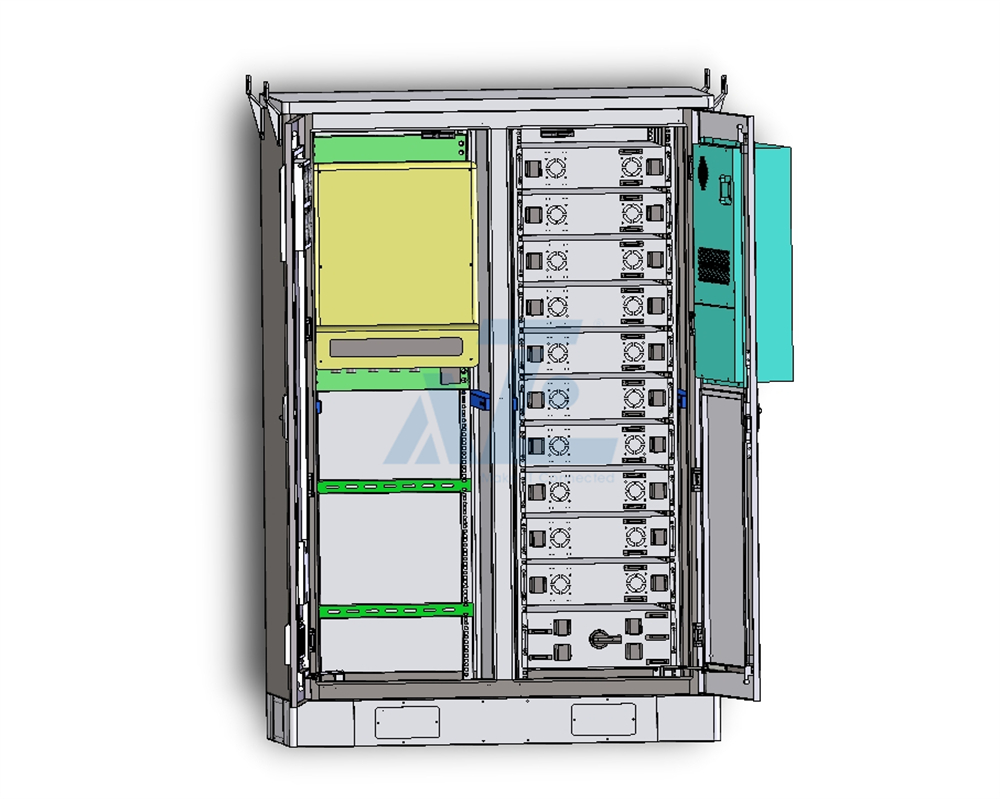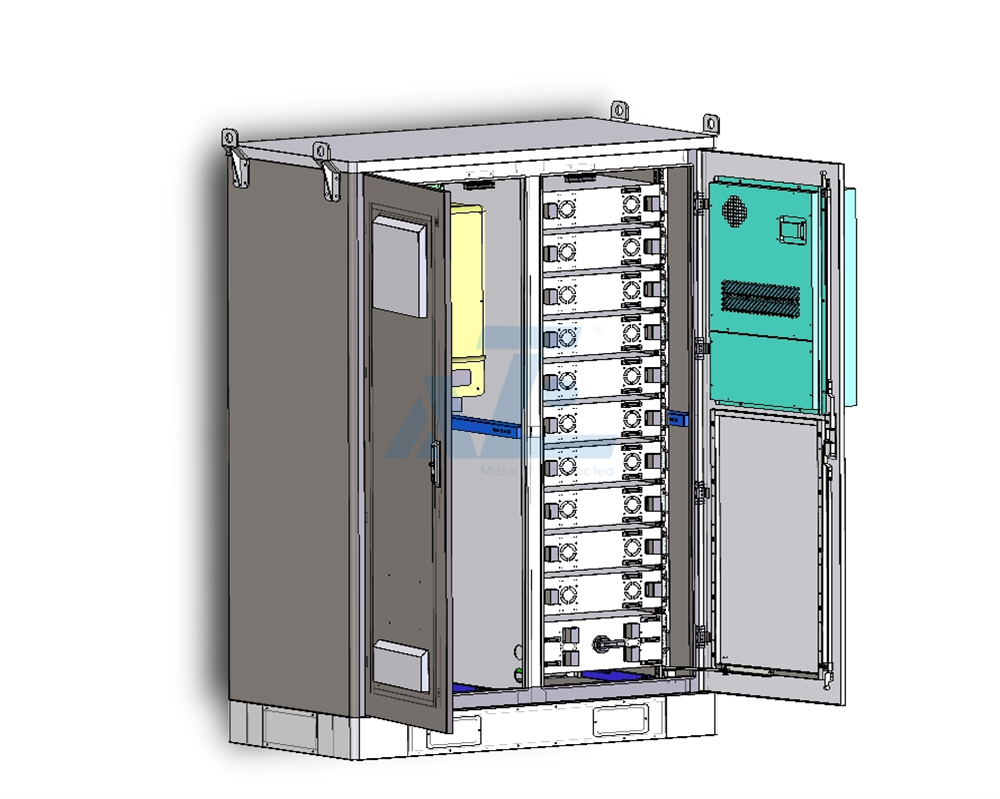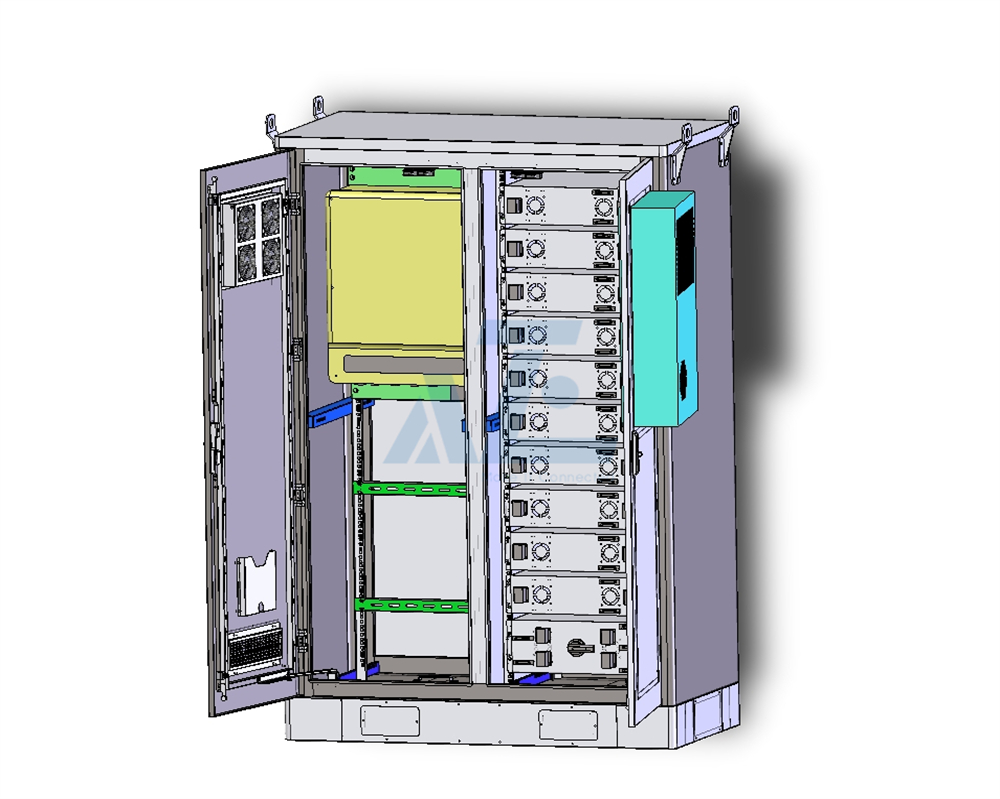







Industrial ESS Cabinets: Large-Scale Energy Storage Solutions
Model:RODF421375DC1K5W-B10
Industrial Energy Storage System (ESS) Cabinets are high-capacity battery banks designed for factories, power plants, and grid-scale applications. Unlike residential ESS units, these systems store hundreds of kWh to MWh of energy, supporting:
✔ Peak shaving – Slash demand charges by 30-50%
✔ Microgrids – Stabilize off-grid industrial operations
✔ Renewable integration – Store excess solar/wind energy
✔ Backup power – Prevent costly downtime during outages
Key Features:
✔ Modular Design – Scale from 500 kWh to 10+ MWh
✔ High-Power Inverters – Support 480V+ industrial loads
✔ Grid Services – Participate in frequency regulation & VPPs
✔ Industrial-Grade Safety – Fire suppression
Overview
In today’s rapidly evolving energy landscape, Energy Storage Systems (ESS) are revolutionizing how industries, data centers, and renewable energy projects manage power. Among the most advanced solutions are ESS Battery Cabinets, designed for scalability, efficiency, and reliability.
At AZE, we specialize in cutting-edge battery power solutions ESS, including liquid-cooled ESS, server rack battery cabinets, and long-duration storage systems.
An ESS cabinet stores energy when it’s cheap or abundant (solar/grid) and releases it when needed, optimizing costs and reliability. It’s a smart, automated system that integrates with solar, grid, and backup power needs.
1. "What is ESS Cabinet?"
An ESS Cabinet (Energy Storage System Cabinet) is a sophisticated battery storage unit that stores electrical energy from solar panels or the grid for later use. Designed for homes, businesses, and industries, ESS cabinets provide backup power, reduce electricity costs, and optimize renewable energy usage. These systems typically include lithium-ion batteries, a Battery Management System (BMS), and smart energy controls to ensure efficient, safe operation.
Why It Matters:
✔ Stores excess solar energy for nighttime/cloudy days
✔ Provides uninterrupted power during outages
✔ Helps lower electricity bills through peak shaving
2. "Who is ESS?"
ESS (Energy Storage Systems) refers to companies or technologies specializing in battery-based energy storage solutions. Brands like Tesla Powerwall, LG Chem, and BYD produce ESS products, including solar batteries, grid-scale storage, and smart energy cabinets. ESS systems are used by homeowners, businesses, and utilities to store renewable energy, stabilize grids, and cut energy costs.
Key Applications:
✔ Residential – Solar storage & backup power
✔Commercial – Peak demand reduction
✔ Industrial – Large-scale energy management
3. "What Does ESS Stand For?"
ESS stands for Energy Storage System – a technology that captures and stores electricity for later use. ESS solutions include battery cabinets, solar storage systems, and grid-scale batteries, enabling efficient energy use, cost savings, and reduced reliance on fossil fuels.
Common ESS Types:
-
Lithium-ion ESS (e.g., Tesla Powerwall)
-
Flow Batteries (Long-duration storage)
-
Hybrid ESS (Solar + Grid + Battery)
4. "Why Should You Buy an ESS Cabinet?"
Buying an ESS Cabinet offers energy independence, cost savings, and eco-friendly power. Here’s why it’s a smart investment:
✅ Lower Electricity Bills – Store cheap off-peak energy, avoid peak rates
✅ Backup Power – Never lose power during outages
✅ Solar Optimization – Use more of your solar energy, less grid power
✅ Grid Independence – Reduce reliance on utility companies
✅ Future-Proofing – Prepares for rising energy costs & blackouts
Best For: Homes with solar, businesses with high energy demand, and off-grid setups.
5. "How Does the ESS Cabinet Work?"
An ESS Cabinet works in 3 key steps:
1️⃣ Charging – Stores energy from solar panels or the grid (at low-cost times).
2️⃣ Management – The Battery Management System (BMS) protects batteries, while the Energy Management System (EMS) optimizes usage.
3️⃣ Discharging – Releases stored power during high-demand periods, outages, or when solar isn’t available.
Smart Features:
✔Auto-Switching – Seamless backup during blackouts
✔ Peak Shaving – Avoids expensive grid power
✔ Solar Self-Consumption – Maximizes renewable energy use
6. "What is a Smart Energy Storage Cabinet?"
A Smart Energy Storage Cabinet is an AI-powered ESS that intelligently manages electricity storage and distribution. Unlike traditional batteries, it uses real-time data, weather forecasts, and energy pricing to optimize usage.
Key Features:
✔ AI Energy Management – Learns usage patterns for max savings
✔Remote Control – Monitor & adjust via smartphone
✔ Multi-Source Charging – Works with solar, grid, generators
✔ Demand Response – Sells excess energy back to the grid
Ideal For: Smart homes, businesses with dynamic energy needs, and renewable energy projects.
7. What types of batteries are used in ESS Cabinets?
ESS Cabinets primarily use:
-
Lithium-ion (Li-ion) – High energy density, long lifespan (Tesla Powerwall, LG Chem)
-
Lithium Iron Phosphate (LiFePO4) – Safer, longer cycle life (BYD, CATL)
-
Flow Batteries – For large-scale, long-duration storage
-
Lead-Acid – Budget option (less efficient, shorter lifespan)
8. What is the lifespan of an ESS Cabinet?
Most ESS Cabinets last 10-15 years or 6,000-10,000 charge cycles, depending on:
-
Battery chemistry (LiFePO4 lasts longer than Li-ion)
-
Depth of discharge (DoD) – Shallower cycles extend life
-
Temperature control (optimal range: 15°C–25°C)
9. Can ESS Cabinets work without solar panels?
Yes! ESS Cabinets can:
-
Charge from the grid during off-peak hours (time-of-use arbitrage)
-
Provide backup power during outages
-
Integrate with generators or wind turbines
10. How much does an ESS Cabinet cost?
Prices vary by capacity and brand:
-
Residential (5–20 kWh): 3,000–3,000–15,000
-
Commercial (50–500 kWh): 20,000–20,000–200,000
-
Key factors: Battery type, inverter included, installation complexity
11. Are there government incentives for ESS Cabinets?
Yes! Many countries offer:
-
Tax credits (e.g., U.S. ITC covers 30% of solar + storage costs)
-
Rebates (e.g., California’s SGIP program)
-
Net metering for excess solar fed back to the grid
12. What’s the ROI period for an ESS Cabinet?
Typically 5–8 years, depending on:
-
Local electricity rates
-
Solar panel pairing
-
Incentives used
-
Peak shaving savings (for businesses)
13. Can I install an ESS Cabinet myself?
No! ESS installation requires:
-
Licensed electricians (due to high-voltage components)
-
Compliance with local electrical codes
-
Grid interconnection permits (if tied to the utility)
14. Are ESS Cabinets compatible with all solar inverters?
Not always. ESS Cabinets work best with:
-
Hybrid inverters (e.g., SolarEdge, Victron)
-
AC-coupled systems (if adding storage to existing solar)
-
Check manufacturer compatibility lists before buying
15. How much space does an ESS Cabinet need?
Residential units are wall-mounted or floor-standing, requiring:
-
Indoor space: 0.5–2 m² (protected from weather)
-
Clearance: 30–50 cm for ventilation
-
Weight: 50–150 kg (ensure wall/floor can support it)
16. How fast can an ESS Cabinet switch to backup power?
Modern ESS Cabinets switch instantly (<20 milliseconds) – fast enough to keep computers and appliances running without interruption.
17. Are ESS Cabinets fireproof?
While no battery is 100% fireproof, ESS Cabinets include:
-
Thermal sensors to prevent overheating
-
Fire retardant materials (e.g., metal enclosures)
-
Automatic shutdown in case of faults
18. Can ESS Cabinets power an entire house?
Depends on:
-
ESS capacity (10+ kWh for average homes)
-
Load management (prioritize essentials during outages)
-
Solar panel support (for extended off-grid use)
19. What’s the future of ESS Cabinets?
Emerging trends include:
-
Solid-state batteries (higher safety/energy density)
-
Vehicle-to-Grid (V2G) integration (using EV batteries as ESS)
-
AI-driven energy trading (automatically sell excess power)
20. Can ESS Cabinets charge electric vehicles (EVs)?
Yes! Some advanced ESS Cabinets:
-
Prioritize solar energy for EV charging
-
Reduce grid demand during peak hours
-
Support bidirectional charging (V2H) – Using EV batteries to power homes
21. What Are ESS Battery Cabinets?
ESS Battery Cabinets are modular, high-capacity energy storage units that house lithium-ion or LiFePO4 batteries, advanced Battery Management Systems (BMS), and thermal controls. These cabinets provide:
✔ Scalable storage (50kWh – 10MWh+)
✔ Peak shaving & demand charge reduction
✔ Backup power for critical operations
✔ Renewable energy integration (solar/wind)
Industries Using ESS Cabinets:
-
Manufacturing plants (reducing energy costs)
-
Data centers (ensuring uptime)
-
Utilities & microgrids (grid stabilization)
-
EV charging stations (managing high-power demand)
22. Liquid Cooled ESS: Superior Thermal Management
Traditional air-cooled systems struggle with heat dissipation in high-demand environments. Liquid-cooled ESS uses advanced cooling fluids to:
✔ Extend battery lifespan (20% more cycles)
✔ Increase energy density (30% more compact)
✔ Maintain stable temps in extreme conditions
Best for:
-
High-performance data centers
-
Industrial facilities with heavy loads
-
Fast EV charging hubs
23. Server Rack Battery Cabinet: Space-Efficient Energy Storage
For businesses needing high-density power in limited spaces, server rack battery cabinets offer a streamlined solution. These systems fit into standard 19” or 42U racks and provide:
✔ Plug-and-play installation
✔ Hot-swappable battery modules
✔ Cloud-based energy monitoring
Common Applications:
-
Telecom towers
-
Edge computing facilities
-
Modular microgrids
Why Choose AZE for ESS Storage Systems?
At AZE, we deliver custom ESS battery storage systems tailored to your needs:
✅ End-to-end solutions (design, installation, maintenance)
✅ Industry-leading safety certifications (UL9540, IEC 62619)
✅ AI-powered energy management for max ROI
✅ Global support & warranty coverage
Conclusion: The Future of ESS Energy Storage Systems
From liquid-cooled ESS for high-density applications to server rack-compatible cabinets for compact spaces, the evolution of ESS storage systems is unlocking new possibilities in energy resilience and sustainability.
Ready to upgrade your energy infrastructure? Contact AZE today for a free ESS consultation and discover the best battery power solutions ESS for your business!
Specification
| Environmental | |
| IP (Ingress Protection) Rating | IP55,NEMA 4,NEMA 4X |
| Working Temperature | -40~55℃ |
| Physical | |
| Color | GREY RAL7035 |
| Material | Galvanized steel(Aluminum/stainless steel/Color coated steel optional) |
| Unit Dimensions (WxDxH) | 25.6inches x 24inches x 40.23inches |
| Unit Weight | 160lbs. |
| Shipping Dimensions(WxDxH) | 27.6inches x 26inches x 48.23inches |
| Shipping Weight | 200lbs. |
| Weight Capacity (static load) | 800lbs. |
| Electronics | |
| Cooling | Cabinet Air Conditioner (Heat Exchanger/Thermoelectric Cooler(TEC) Optional) |
| Heating | As optional |
| Fans | DC48V |
| Power | PDU(Basic or Smart),AC/DC Power,Built-in Power Optional |
| Sensors | Door Sensor/Water Sensor/Temperature & Humidity sensor/Smoke sensor/Tilt & Shock sensor |
| Monitoring | EMS,KVM Switches,Smart PDU |
| Certifications | |
| Approvals | EIA/ECA-310-E, IEC 294-2, RoHS |
| Safety | CE |
| Warranty | |
| Standard warranty | 1 Year |
How to Order
Industrial ESS Cabinets: Powering the Future of Large-Scale Energy Storage
In today's energy-intensive industrial landscape, Industrial ESS (Energy Storage System) Cabinets are revolutionizing how factories, utilities, and large facilities manage power. These cutting-edge megawatt-scale battery solutions deliver unmatched efficiency, reliability, and cost savings for demanding commercial applications.
Why Industrial ESS Cabinets?
✔ Massive Energy Capacity – Store 500kWh to 10MWh+ to support heavy machinery, data centers, and manufacturing plants
✔ Peak Demand Shaving – Slash 30-50% off energy bills by avoiding costly utility demand charges
✔ 24/7 Power Reliability – Instant backup power eliminates costly downtime (0ms switch time vs. generators' 10-30 second delay)
✔ Renewable Energy Maximization – Store excess solar/wind power for use during peak hours or outages
✔ Smart Grid Integration – Participate in demand response programs and virtual power plants (VPPs)
Industry-Leading Features
✔ Modular, Scalable Design – Start small and expand as needed with plug-and-play battery cabinets
✔ High-Power Output – Supports 480V+ industrial loads with advanced inverters
✔ Sustainable Operations – Reduce carbon footprint by 20-30% when paired with renewables
✔ Military-Grade Safety – UL1973 certified with fire suppression and thermal runaway protection
Who Needs Industrial ESS?
✔ Manufacturing Plants – Stabilize energy costs and prevent production stoppages
✔ Data Centers – Ensure uninterrupted uptime for critical servers
✔ Utilities & Microgrids – Balance load and defer expensive infrastructure upgrades
✔ Mining/Remote Operations – Replace noisy, polluting diesel generators
The Future of Industrial Energy Storage
• AI-Optimized Charging – Machine learning predicts energy needs for maximum savings
• Second-Life EV Batteries – Sustainable, cost-effective storage alternative
• Vehicle-to-Grid (V2G) – Leverage EV fleets as mobile energy storage
ROI You Can Count On
Most industrial facilities see full payback in 3-5 years through:
-
Demand charge reduction
-
Energy arbitrage profits
-
Avoided downtime costs
-
Government incentives
**********Notes**********
-
Shipping Option: Assembly unit with carton or wood pallet
-
Waterproof outdoor electrical enclosures IP Rating: IP55,IP65 rated or NEMA 3R,NEMA 4, NEMA 4X rated available
-
Outdoor Enclosures Material Options: SPCC Cold Steel, Galvanized steel, Stainless steel or Aluminum available.
-
Outdoor Telecom Cabinet Cooling options: such as cooling fans, Cabinet air conditioner , Plate heat exchanger and Thermoelectric cooler available.
|
No.
|
Item
|
Specifications
|
|
1
|
AC110V or 220V/DC48V, Cooling Capacity 300W-5000W
|
|
|
2
|
DC48V, Heat transfer 40W/K-200W/K
|
|
|
3
|
DC48V, Cooling capacity 100W-300W
|
|
|
4
|
Fan
|
AC110/220V or DC 48V
|
-
A wide range of server rack accessories ,Fiber optics cabling solutions,Server Rack PDUs and KVM solutions compatablity
-
Grey(RAL7035) or other customize colors available
-
Outdoor telecom enclosure optional accessory parts
|
No.
|
Item
|
Specifications
|
|
1
|
Fan
|
AC110/220V or DC 48V
|
|
2
|
Power Supply
|
AC INPUT: 32A/1P MCB or 63A/2P MCB
DC OUTPUT: 16A/1P MCB |
|
3
|
Environment Monitoring Unit
|
48VDC Communication port: RS485, TCP/IP, SNMP optional
|
|
4
|
Door Sensor
|
Monitor door open status inside cabinet and provide real time alarm.
|
|
5
|
Water Sensor
|
Monitor water status inside cabinet and provide real time alarm.
|
|
6
|
Tilt & Shock Sensor
|
Monitor shock status inside cabinet and provide real time alarm.
|
|
7
|
Temperature & Humidity Sensor
|
Monitor temperature and humidity inside cabinet and provide real time alarm.
|
|
8
|
Smoke Sensor
|
Monitor smoke status inside cabinet and provide real time alarm.
|
Outdoor Battery Cabinet Enclosures can be customized for all Outside Plant applications - special engineering and additional equipment integration also available. Additional cabinet sizes are available. Call us or email us for information and pricing.
GET A QUOTE
How It Works:
1.Submit your project details
2.Our engineers review specs & volume
3.Receive a no-obligation quote (with prototype options if eligible)
Prototype availability depends on:
• Project complexity • Order quantity • Technical feasibility
Why AZE?
✓ 100+ Custom Solutions Delivered
✓ 48-Hour Quote Guarantee
✓ End-to-End Support
